
Mining enterprises of Ukraine in January-October of this year reduced the export of iron ore raw materials (IORM) in kind by 38.9% compared to the same period last year – up to 22 million 436.474 thousand tons.
According to statistics released by the State Customs Service (STS), over the specified period, foreign exchange earnings from the export of iron ore decreased by 56.2% – to $2 billion 768.743 million.
During the specified period, IORM was imported to Ukraine for $42 thousand in a total volume of 74 tons, while in January-October 2021 – for $160 thousand in a total volume of 1.175 thousand tons.
As reported, Ukraine in 2021 reduced the export of iron ore raw materials (IORM) in physical terms by 4.2% compared to 2020 – up to 44 million 357.727 thousand tons, but increased revenue by 62.8% – up to $6 billion 899.816 million The export of iron ore was carried out mainly to China (41.90% of supplies in monetary terms), the Czech Republic (9.65%) and Poland (7.99%).
Last year, IORM was imported to Ukraine for $184 thousand in a total volume of 1.202 thousand tons, while in 2020 123 tons of iron ore for $75 thousand were imported. Imports for 2021 were carried out from Egypt (55.98%), the Netherlands ( 21.2%) and Poland (7.07%).
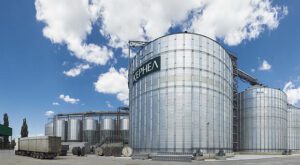
The agro-industrial group Kernel is negotiating with its creditors to defer the repayment of debt obligations that have grown to a record high since the beginning of the Russian military invasion of Ukraine – up to $1.95 billion as of June 30, 2022, which is 37% more than its amount as of the same date in 2021 of the year.
According to a financial report on the holding’s website on Wednesday night, this increase in debt was mainly due to a sharp increase in short-term debt raised to replenish working capital in the winter of 2021-2022 and outstanding by the summer of 2022 due to Russian aggression and related with it negative factors.
According to the group of companies, its net debt obligations by June 30, 2022 increased by 1.8 times compared to the same date last year – to $ 1.49 billion, and the ratio of debt to EBITDA jumped to a record five-year ratio of 6.8x compared to 1.0x in 2021.
“The Russian invasion began just at the peak of our working capital cycle, when we had the highest seasonal debt level of $1.95 billion in the history of the company and an all-time high inventory of $0.9 billion. Fortunately, we entered into this is a turbulent time in a relatively good financial condition, so we continued to service our debt, but we were forced to negotiate a deferral of repayment of the principal debt to creditors,” the holding said in a statement.
Kernel recalled that the first such negotiations allowed it to defer the repayment of the principal amount of the debt until September 30, 2022, and now it is negotiating to extend the delay until June 30, 2023.
“As of the day of this report, we received refusals to extend the maturity of the principal debt in the amount of $627 million with creditors until June 30, 2023. For debt obligations totaling $246 million, we are in the process of issuing such refusals,” the holding emphasized in the report .
Kernel specified that in December 2021 it completed the early redemption of Eurobonds for $213 million, reducing the total amount of Eurobonds maturing in 2022 to $595 million.
“Due to the fact that the group did not have an unconditional right to defer settlements of 12 months or more in relation to its banking services as at June 30, 2022, $198 million of long-term bank loan balances and $595 million of Eurobonds outstanding were reclassified as short-term as of June 30, 2022,” the holding said in a statement.
Also, according to him, by June 30, 2022, Kernel pledged 370,000 government bonds of Ukraine in the amount of $6.08 million as collateral for previously taken short-term loans.
“While we have completed one of the most difficult periods in our history, the prospects for the future remain unclear and will greatly depend on the outcome of the war in Ukraine and the group’s ability to export agricultural products through the Black Sea ports of Ukraine,” the holding stated.
Before the war, Kernel ranked first in the world in the production of sunflower oil (about 7% of world production) and its export (about 12%), and was also the largest producer and seller of bottled sunflower oil in Ukraine. In addition, the company was engaged in the cultivation of other agricultural products and their sale.
The largest co-owner of Kernel through Namsen Ltd. is Ukrainian businessman Andrey Verevsky with a share of 39.3%.
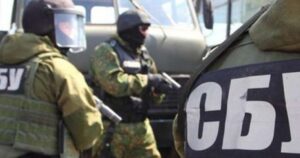
The premises of the National Union of Architects of Ukraine (NUAU) are being searched, said Anna Kiriy, Deputy Chairman of the Architectural Chamber of the NUAU.
“Just now there is a search in the premises of the NSAU. As many as two majors and one lieutenant of the SBU are involved. Apparently, such important people in time of war should coddle the professional National Union, and not look for Russian saboteurs,” she wrote on Facebook.
According to her, there is a seizure of equipment and computers.
Source: https://www.facebook.com/anna.kyrii
https://www.facebook.com/photo?fbid=6121115427921949&set=pcb.6121159117917580
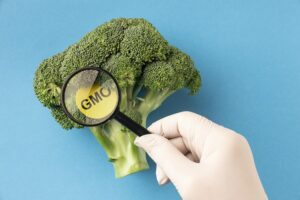
The Verkhovna Rada intends to regulate the sphere of handling genetically modified organisms (GMOs) and improve the system of assessing their risks as to their possible impact on human health and the environment.
The relevant draft law No. 5839 “On state regulation of genetically engineered activities and state control over the handling of GMOs and genetically modified products to ensure food security” was approved as a basis at the parliamentary session on Wednesday by 247 MPs (with the required 226 votes), a member of the Golos faction Yaroslav Zheleznyak said in a Telegram feed.
According to the explanatory note to the document, its adoption will allow to delineate the powers of public authorities to eliminate duplication of functions in the field of handling GMOs, to improve the system of risk assessment of GMOs on the possible impact on human health and the environment.
In addition, the document will implement European mechanisms for state registration of GMOs in Ukraine, improve the requirements for labeling of GMO products and establish the rules of their traceability as well as strengthen the state control in the field of GMO handling and establish liability for violation of the legislation in this area.
Thus, the adoption of the draft law will allow achieving systemic compatibility of Ukrainian legislation with the EU legislation in the field of GMO handling, which is envisaged by Ukraine’s obligations under the Association Agreement.
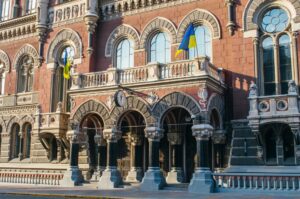
Banks with foreign capital Alfa Bank and Raiffeisen Bank (both in Kiev) topped the list of 46 profitable banks in September with net profit UAH 558.2 million and UAH 522.3 million respectively.
According to the data published by the National Bank of Ukraine on its website with a significant delay, Alfa Bank reduced its reserves by UAH 646.1 mln, while Raiffeisen Bank showed a profit despite the formation of additional 667.9 mln reserves.
Alfa’s assets decreased by UAH 6.6 bln, or 5.9%, while Raiffeisen Bank increased by UAH 5.1 bln, or 3.2%.
There are also three banks with foreign capital in the top five leading positions in September: OTP Bank – UAH 423.0 mln, Ukrsibbank – UAH 399.1 mln and Citibank – UAH 390.5 mln.
Oshchadbank lagged a little behind, showing UAH 371.4 mln of profit in September, despite the increase in reserves by another UAH 1.18 bln. Universal Bank (mono) followed with UAH 222.9 mln and Credit Dnipro Bank with UAH 178.1 mln.
Alfa Bank managed to improve its financial results in September after the largest loss of UAH 1.357 billion, which was registered in August among all banks, while Ukreximbank, that ranked second from the bottom with losses of UAH 1.103 billion, demonstrated only poorer results in September: UAH 3.5 billion with an increase of reserves by UAH 2.47 billion and assets by UAH 16.93 billion.
PrivatBank went from the most profitable bank in August (UAH 3.21 billion) to one of the most unprofitable in September, having showed negative financial results of UAH 317.4 million and decrease of assets by UAH 20.02 billion with insignificant growth of reserves by UAH 0.07 billion.
Idea Bank (UAH 190.3 mln (UAH 67.6 mln), FUIB (UAH 183.1 mln) (UAH 498.1 mln), ProCredit Bank (UAH 145.3 mln) and Alliance Bank (UAH 138.1 mln (UAH 86 mln)) were among the banks with significant losses as of September.
According to the results of nine months of this year, PrivatBank remains the most profitable – UAH 13.83 billion.
It is followed by Oshchadbank with 2.71 billion UAH, Raiffeisen Bank with 2.39 billion UAH, Ukrsibbank with 2.10 billion UAH and Citibank with 1.51 billion UAH, and three private Ukrainian banks: Universal Bank with 0.88 billion UAH, Pivdenny Bank with 0.34 billion UAH and Aybox Bank with 0.29 billion UAH.
The biggest losses in January-September were shown by Ukreximbank – UAH 7.91 billion, Alfa Bank – UAH 4.32 billion, and state-owned Ukrgasbank – UAH 3.36 billion.
ProCredit Bank and Idea Bank are at the bottom of the five losing banks with UAH 1.43 billion and UAH 0.23 billion.
Within nine months of this year 44 banks showed net profit, while 23 banks showed net loss.
The total net profit of all banks amounted to 7.37 billion UAH after the net loss, including 1.06 billion UAH in September. However, excluding PrivatBank, the financial result of the banking system for the nine months will also be negative – 6.46 billion UAH.
According to the National Bank, in September, the total portfolio of government bonds of all banks decreased by UAH 0.24 billion, most of all in Alpha Bank – UAH 1.97 billion, while FUIB – UAH 0.56 billion, Citibank – UAH 0.5 billion, RVS Bank – UAH 0.46 billion.
At the same time, Raiffeisenbank and Oschadbank increased their portfolios of government bonds by UAH 1.09 bln and UAH 2.83 bln, respectively.
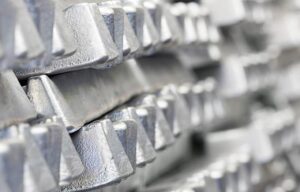
According to customs statistics released by the State Customs Service of Ukraine, the export of aluminum and aluminum products for 10 months of 2022 from Ukraine decreased by 39.1% compared to January-October 2021 – to $83.556 million (in October – $7.695 million), and lead and lead products by 69.5% – to $9.769 million ($0.4 million), nickel and nickel products – by 72.5%, to $1.086 million ($0.007 million).
At the same time, exports of aluminum and aluminum products for 2021 increased by 53.9% to $169.094 million, lead and lead products by 52.8% to $38.229 million and nickel and nickel products by 55% to $4.856 million.